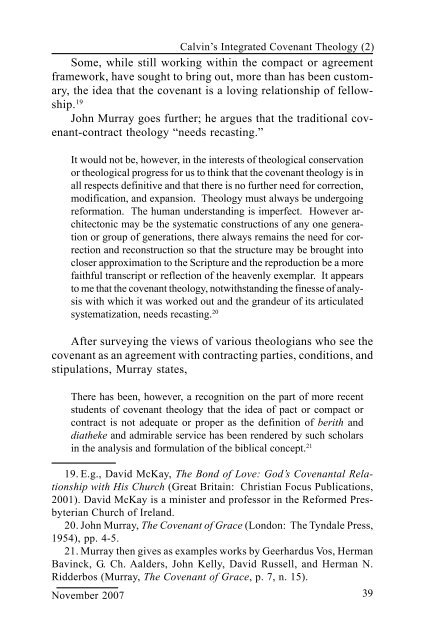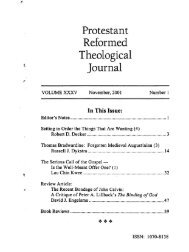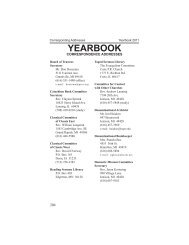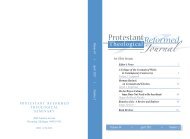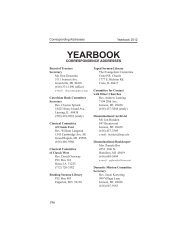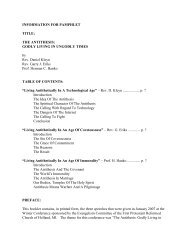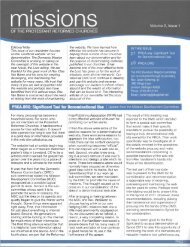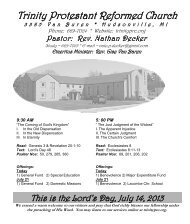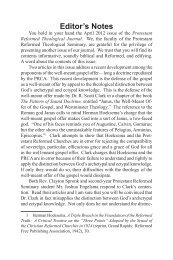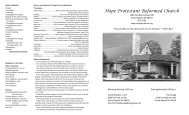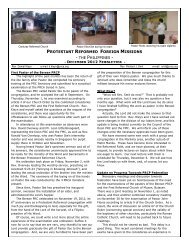November 2007 - Protestant Reformed Churches in America
November 2007 - Protestant Reformed Churches in America
November 2007 - Protestant Reformed Churches in America
Create successful ePaper yourself
Turn your PDF publications into a flip-book with our unique Google optimized e-Paper software.
Calv<strong>in</strong>’s Integrated Covenant Theology (2)<br />
Some, while still work<strong>in</strong>g with<strong>in</strong> the compact or agreement<br />
framework, have sought to br<strong>in</strong>g out, more than has been customary,<br />
the idea that the covenant is a lov<strong>in</strong>g relationship of fellowship.<br />
19<br />
John Murray goes further; he argues that the traditional covenant-contract<br />
theology “needs recast<strong>in</strong>g.”<br />
It would not be, however, <strong>in</strong> the <strong>in</strong>terests of theological conservation<br />
or theological progress for us to th<strong>in</strong>k that the covenant theology is <strong>in</strong><br />
all respects def<strong>in</strong>itive and that there is no further need for correction,<br />
modification, and expansion. Theology must always be undergo<strong>in</strong>g<br />
reformation. The human understand<strong>in</strong>g is imperfect. However architectonic<br />
may be the systematic constructions of any one generation<br />
or group of generations, there always rema<strong>in</strong>s the need for correction<br />
and reconstruction so that the structure may be brought <strong>in</strong>to<br />
closer approximation to the Scripture and the reproduction be a more<br />
faithful transcript or reflection of the heavenly exemplar. It appears<br />
to me that the covenant theology, notwithstand<strong>in</strong>g the f<strong>in</strong>esse of analysis<br />
with which it was worked out and the grandeur of its articulated<br />
systematization, needs recast<strong>in</strong>g. 20<br />
After survey<strong>in</strong>g the views of various theologians who see the<br />
covenant as an agreement with contract<strong>in</strong>g parties, conditions, and<br />
stipulations, Murray states,<br />
There has been, however, a recognition on the part of more recent<br />
students of covenant theology that the idea of pact or compact or<br />
contract is not adequate or proper as the def<strong>in</strong>ition of berith and<br />
diatheke and admirable service has been rendered by such scholars<br />
<strong>in</strong> the analysis and formulation of the biblical concept. 21<br />
19. E.g., David McKay, The Bond of Love: God’s Covenantal Relationship<br />
with His Church (Great Brita<strong>in</strong>: Christian Focus Publications,<br />
2001). David McKay is a m<strong>in</strong>ister and professor <strong>in</strong> the <strong>Reformed</strong> Presbyterian<br />
Church of Ireland.<br />
20. John Murray, The Covenant of Grace (London: The Tyndale Press,<br />
1954), pp. 4-5.<br />
21. Murray then gives as examples works by Geerhardus Vos, Herman<br />
Bav<strong>in</strong>ck, G. Ch. Aalders, John Kelly, David Russell, and Herman N.<br />
Ridderbos (Murray, The Covenant of Grace, p. 7, n. 15).<br />
<strong>November</strong> <strong>2007</strong> 39


